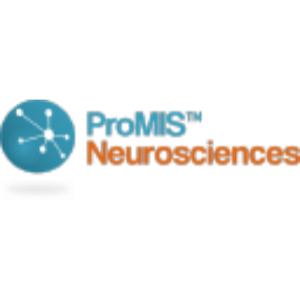ProMIS Neurosciences Strengthens Global Intellectual Property Portfolio
Adds Key U.S. and International Patent Allowances to Further Protect the Company’s Monoclonal Antibody Therapeutic for the Treatment of Alzheimer’s Disease
CAMBRIDGE, Massachusetts and TORONTO, Ontario, March 11, 2024 (GLOBE NEWSWIRE) -- ProMIS Neurosciences, Inc. (Nasdaq: PMN), a biotechnology company focused on the generation and development of therapeutics targeting toxic misfolded proteins in neurodegenerative diseases, today announced that the European Patent Office, Japanese Patent Office and IP Australia, the Australian patent office, have recently allowed composition of matter and method of use patent applications related to ProMIS Neurosciences’ lead product candidate, PMN310, for the treatment of Alzheimer’s disease (AD) (EP 18 835 520.0; JP7448174; AU2022201737). PMN310 is the Company’s novel monoclonal antibody that is designed to be highly selective for toxic oligomers of amyloid-beta (Aβ), which are believed to be a major driver of AD.
The United States Patent and Trademark Office also recently granted US Patent 11,905,317 directed to immunogenic compositions of matter that are being developed for treating AD. Protection for the immunogenic compositions of matter has also been obtained in Japan, Korea, India and Australia. Further, patent applications were also recently allowed in the U.S. and Japan for two other Aβ targets.
“We are building a fortress of intellectual property protection around our novel approach to targeting toxic misfolded proteins to treat neurodegenerative diseases and these newly allowed patents validate that innovation in important geographies around the world,” stated Neil Warma, Chief Executive Officer of ProMIS Neurosciences. “Given the tremendous market opportunity for PMN310 to potentially transform the treatment landscape for Alzheimer’s disease, we are particularly pleased to add these new layers of protection for our novel monoclonal antibody therapeutic for the treatment of this debilitating neurodegenerative disease that impacts millions of patients worldwide.”
The newly allowed patents add to the six patents granted in 2023, four of which relate to PMN310 and bring the total of issued or allowed patents pertaining to the PMN310 portfolio to 10. The recently allowed and granted patents are either co-owned or exclusively licensed from The University of British Columbia (UBC) as part of a patent portfolio comprising over 25 issued or allowed patents and includes numerous other patent applications.
About ProMIS Neurosciences Inc.
ProMIS Neurosciences Inc. is a clinical stage biotechnology company focused on generating and developing antibody therapeutics selectively targeting toxic misfolded proteins in neurodegenerative diseases such as Alzheimer’s disease (AD), amyotrophic lateral sclerosis (ALS) and multiple system atrophy (MSA). The Company’s proprietary target discovery engine applies a thermodynamic, computational discovery platform - ProMIS™ and Collective Coordinates - to predict novel targets known as Disease Specific Epitopes on the molecular surface of misfolded proteins. Using this unique approach, the Company is developing novel antibody therapeutics for AD, ALS and MSA. ProMIS has offices in Toronto, Ontario and Cambridge, Massachusetts.
Forward Looking Statement
This press release contains forward-looking statements that are made pursuant to the safe harbor provisions of the Private Securities Litigation Reform Act of 1995. Certain information in this news release constitutes forward-looking statements and forward-looking information (collectively, “forward-looking information”) within the meaning of applicable securities laws. In some cases, but not necessarily in all cases, forward-looking information can be identified by the use of forward-looking terminology such as “plans”, “excited to”, “targets”, “expects” or “does not expect”, “is expected”, “an opportunity exists”, “is positioned”, “estimates”, “intends”, “assumes”, “anticipates” or “does not anticipate” or “believes”, or variations of such words and phrases or state that certain actions, events or results “may”, “could”, “would”, “might”, “will” or “will be taken”, “occur” or “be achieved”. In addition, any statements that refer to expectations, projections or other characterizations of future events or circumstances contain forward-looking information. Statements containing forward-looking information are not historical facts but instead represent management's current expectations, estimates and projections regarding the future of our business, future plans, strategies, projections, anticipated events and trends, the economy and other future conditions. Forward-looking information is necessarily based on a number of opinions, assumptions and estimates that, while considered reasonable by the Company as of the date of this news release, are subject to known and unknown risks, uncertainties and assumptions and other factors that may cause the actual results, level of activity, performance or achievements to be materially different from those expressed or implied by such forward-looking information, including, but not limited to, the Company’s ability to fund its operations and continue as a going concern, its accumulated deficit and the expectation for continued losses and future financial results. Important factors that could cause actual results to differ materially from those indicated in the forward-looking information include, among others, the factors discussed throughout the “Risk Factors” section of the Company's most recently filed annual information form available on www.SEDAR.com, in Item 1A of its Annual Report on Form 10-K for the year ended December 31, 2022 and the section entitled “Risk Factors” in its Post-Effective Amendment No. 1 to Form S-1, filed March 17, 2023, each as filed with the Securities and Exchange Commission, and subsequent quarterly reports. Except as required by applicable securities laws, the Company undertakes no obligation to publicly update any forward-looking information, whether written or oral, that may be made from time to time, whether as a result of new information, future developments or otherwise.
For further information:
Visit us at www.promisneurosciences.com
Please submit media inquiries to info@promisneurosciences.com.
For Investor Relations:
Stern Investor Relations
Anne Marie Fields, Managing Director
annemarie.fields@sternir.com
Tel. 212-362-1200








